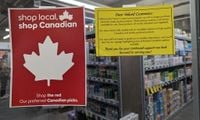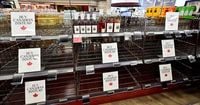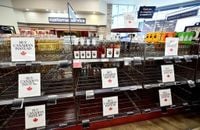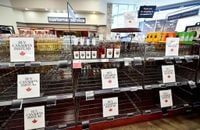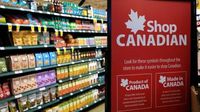The growing "Buy Canadian" movement is reshaping the dynamics of U.S.-Canada trade, with U.S. consumer goods companies reporting disruptions as Canadian retailers and shoppers increasingly turn to homegrown alternatives. Several U.S. businesses say recent political tensions have triggered a shift in sentiment that is directly affecting their ability to sell products in Canada.
Parasol Co, a California-based diaper and baby wipe company, had been working with a distributor since January to place its products in more Canadian stores, including convenience retailers. CEO Jessica Hung said that in early March, the unnamed distributor halted the plan due to anti-American sentiment linked to political developments. The distributor told Parasol it had been instructed by a retailer to pause any American brand launches and would reevaluate once market conditions changed.
Hung said the decision came as a surprise and was something the company had not encountered before. Canada imported nearly $350 billion in goods from the United States in 2024, making the U.S. its top trading partner. However, recent statements by U.S. President Donald Trump suggesting annexation of Canada, along with the imposition of a 25 percent tariff on Canadian steel and aluminum and the threat of broader import taxes, have fueled a growing wave of patriotic consumerism across Canada. The result is a push by Canadian shoppers to avoid U.S. products.
Parasol had already begun preparing products for Canadian markets, including packaging in French. Hung said she had made product decisions specific to the now-canceled launch. Meanwhile, Canadian consumers like Rebecca Asselin from Quebec are actively switching to domestic brands. Asselin said she had not previously thought about where her diapers came from but recently began purchasing Royale diapers, made in New Brunswick by Irving Personal Care.
The company confirmed that interest from retailers has surged and weekly shipments have quadrupled. The trend extends beyond diapers. American beverage producers and citrus exporters also report slowing sales in Canada. Brown Forman, the maker of Jack Daniel's, said the removal of U.S. whiskey from Canadian liquor stores in early March was a worse blow than retaliatory tariffs. A source involved with California citrus exports said Canadian orders were canceled around the same time.
GT's Living Foods, based in Los Angeles and known for its Synergy kombucha, said large Canadian retailers including Walmart and Metro are cutting back on orders. Daniel Bukowski, who handled Canadian accounts for the company until mid-March, said distributors told him orders were being reduced due to tariff uncertainty. For example, Walmart Canada and others were opting to purchase one truckload instead of two.
Walmart stated that it will continue working with suppliers during these uncertain times. Metro responded that while it favors Canadian products when possible, it does not intend to remove American goods unless tariffs are imposed. Loblaw's and Sobey's did not respond to inquiries.
Demeter Fragrances, a Pennsylvania-based perfume maker, had been planning to enter the Canadian market in 2025. CEO Mark Crames said the plan has now been abandoned due to shifting Canadian sentiment, which he described as increasingly unfavorable to U.S. goods. He said the expansion effort no longer seemed worthwhile.
Canadian companies are starting to benefit from the shift. Grime Eater Products Limited, which manufactures hand cleaning products, said that after years of trying to get shelf space at Canadian Tire, the outlook now appears positive. Vice President Tracy Hayes said she learned the retailer was considering reducing its purchases of Fast Orange, a competing U.S. brand made by Permatex.
As Canadian retailers weigh their product offerings, many U.S. companies are left waiting for political and market conditions to improve. The movement not only reflects changing consumer preferences but also highlights the potential consequences of political rhetoric on international trade relations.
With the looming threat of U.S. President Donald Trump's tariffs, the "Buy Canadian" movement has gained momentum across the country. Retail experts suggest that while the movement may be driven by national pride, it also raises questions about the long-term impact on Canadian consumers and the economy.
As shoppers increasingly opt for local products, the effects on U.S. companies could be significant, particularly for those who have relied heavily on Canadian markets. The situation serves as a reminder of how interconnected economies can be influenced by political discourse and consumer sentiment.
In conclusion, the "Buy Canadian" movement is not just a passing trend; it represents a fundamental shift in how Canadians view their purchasing power in relation to U.S. products. As sentiments shift and political tensions rise, the landscape of trade between the two nations may continue to evolve.
